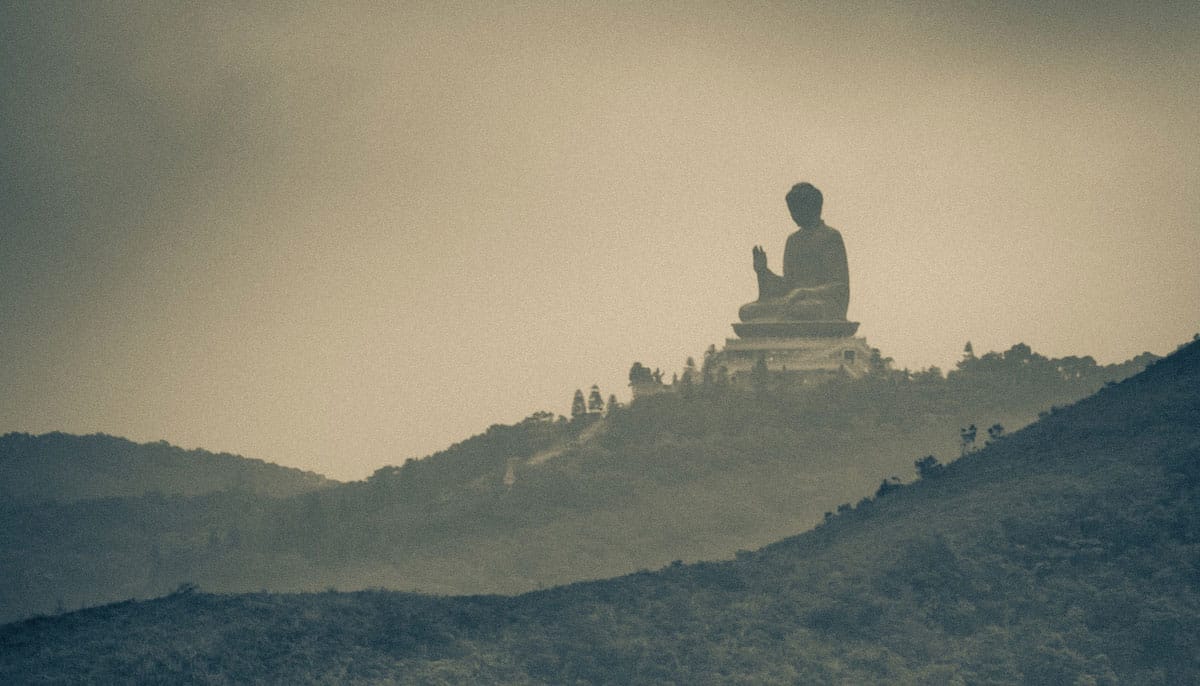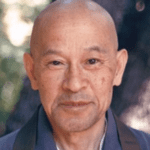In our practice the most important thing is to realize that we have buddhanature. Intellectually we may know this, but it is rather difficult to accept. Our everyday life is in the realm of good and bad, the realm of duality, while buddhanature is found in the realm of the absolute where there is no good and no bad. There is a twofold reality. Our practice is to go beyond the realm of good and bad and to realize the absolute. It may be rather difficult to understand.
Hashimoto Roshi, a famous Zen master who passed away in 1965, said that the way we [Japanese] cook is to prepare each ingredient separately. Rice is here and pickles are over there. But when you put them in your tummy, you don’t know which is which. The soup, rice, pickles, and everything get all mixed up. That is the world of the absolute. As long as rice, pickles and soup remain separate, they are not working. You are not being nourished. That is like your intellectual understanding or book knowledge—it remains separate from your actual life.
Zazen practice is mixing the various ways we have of understanding and letting it all work together. A kerosene lamp will not work merely because it is filled with kerosene. It also needs air for combustion, and even with air, it needs matches. By the aid of matches, air, and kerosene, the lamp will work. This is our zazen practice.
When we practice with the aid of the sangha, helped by Buddha, we can practice zazen in its true sense.
In the same way, even though you say, “I have buddhanature,” that alone is not enough to make it work. If you do not have a friend or a sangha, it won’t work. When we practice with the aid of the sangha, helped by Buddha, we can practice zazen in its true sense. We will have bright light here in the Tassajara zendo or in our daily life.
To have a so-called enlightenment experience is of course important, but what is more important is to know how to adjust the flame in zazen and in our everyday life. When the flame is in complete combustion, you don’t smell the oil. When it is smoky, you will smell something. You may realize that it is a kerosene lamp. When your life is in complete combustion you have no complaint, and there is no need to be aware of your practice. If we talk too much about zazen, it is already a smoky kerosene lamp.
Maybe I am a very smoky kerosene lamp. I don’t necessarily want to give a lecture. I just want to live with you: moving stones, having a nice hot spring bath, and eating something good. Zen is right there. When I start to talk, it is already a smoky kerosene lamp. As long as I must give a lecture I have to explain: “This is right practice, this is wrong, this is how to practice zazen…” It is like giving you a recipe. It doesn’t work. You cannot eat a recipe.
Usually a Zen master will say: “Practice zazen, then you will attain enlightenment. If you attain enlightenment you will be detached from everything, and you will see things as it is.” Of course this is true, but our way is not always so. We are studying how to adjust the flame of our lamp back and forth. Dogen Zenji makes this point in the Shobogenzo. His teaching is to live each moment in complete combustion like a lamp or a candle. To live each moment, becoming one with everything, is the point of his teaching and his practice.
Zazen practice is a very subtle thing. When you practice zazen, you become aware of things you did not notice while you were working. Today I moved stones for a while, and I didn’t realize that my muscles were tired. But when I was calmly sitting zazen, I realized, “Oh! My muscles are in pretty bad condition.” I felt some pain in the various parts of my body. You might think you could practice zazen much better if you had no problem, but actually some problem is necessary. It doesn’t have to be a big one. Through the difficulty you have you can practice zazen. This is an especially meaningful point, which is why Dogen Zenji says, “Practice and enlightenment are one.” Practice is something you do consciously, something you do with effort. There! Right there is enlightenment.
You think that you can only establish true practice after you attain enlightenment, but it is not so.
Many Zen masters missed this point, while they were striving to attain perfect zazen: things that exist are imperfect. That is how everything actually exists in this world. Nothing we see or hear is perfect. But right there in the imperfection is perfect reality. It is true intellectually and also in the realm of practice. It is true on paper and true with our body.
You think that you can only establish true practice after you attain enlightenment, but it is not so. True practice is established in delusion, in frustration. If you make some mistake, that is where to establish your practice. There is no other place for you to establish your practice.
We talk about enlightenment, but in its true sense perfect enlightenment is beyond our understanding, beyond our experience. Even in our imperfect practice enlightenment is there. We just don’t know it. So the point is to find the true meaning of practice before we attain enlightenment. Wherever you are, enlightenment is there. If you stand up right where you are, that is enlightenment.
This is called I-don’t-know zazen. We don’t know what zazen is anymore. I don’t know who I am. To find complete composure when you don’t know who you are or where you are, that is to accept things as it is. Even though you don’t know who you are, you accept yourself. That is “you” in its true sense. When you know who you are, that “you” will not be the real you. You may overestimate yourself quite easily, but when you say, “Oh, I don’t know,” then you are you, and you know yourself completely. That is enlightenment.
I think our teaching is very, very good, but if we become arrogant and believe in ourselves too much we will be lost. There will be no teaching, no Buddhism at all. When we find the joy of our life in our composure, we don’t know what it is, we don’t understand anything, then our mind is very great, very wide. Our mind is open to everything, so it is big enough to know before we know something. We are grateful even before we have something. Even before we attain enlightenment, we are happy to practice our way. Otherwise we cannot attain anything in its true sense.
Thank you very much.
This talk is from “Not Always So,” an outstanding new collection of Suzuki Roshi’s teachings edited by Edward Brown and published by HarperCollins. © 2003 by Shunryu Suzuki. All rights reserved.

